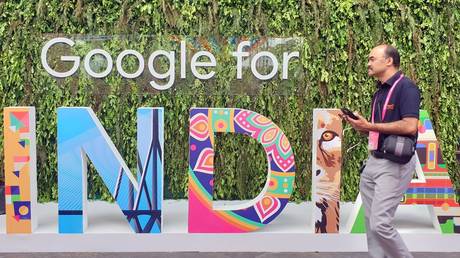

India’s space agency has partnered with MapmyIndia, a tech company specializing in digital map data, to build an alternative to Google Maps. The announcement comes as India rolled out local alternatives to Twitter and WhatsApp.
The new project was announced by the Indian Space Research Organisation and MapmyIndia late on Friday. The two have not yet specified any timeframe within which the service might arrive, nor revealed what it will be called.
The ISRO said the “collaboration will enable them to jointly identify and build holistic geospatial solutions utilizing earth observation datasets.” MapmyIndia was even bolder about the prospects of the joint project, with the company’s CEO Rohan Verma promising the service will “be a much better, more detailed and comprehensive, as well as privacy-centric, hyper-local and indigenous mapping solution for Indians, compared to foreign map apps.”
Also on rt.com India defends digital tax opposed by Washington & US tech giants
“MapmyIndia, being a responsible, local Indian company, ensures that its maps reflect the true sovereignty of the country, depicting India’s borders as per the government of India, and hosts its maps in India,” Verma stated in a LinkedIn post.
The announcement comes within days of India’s rolling-out of local alternatives to Twitter and WhatsApp, named Koo and Sandes, respectively. The development of homegrown apps is part of its drive to become self-reliant in the digital sphere.
The project by ISRO and MapmyIndia has been met with delight by the majority of India’s online crowd, who cheered the country’s efforts to be more self-sufficient.
Woah 🥳The confidence of taking on the Google maps itself is a bold stand. First PPE kits and masks, then corona vaccine, koo app and now this, I think we are seriously marching ahead towards atmanirbhar bharat 🇮🇳
— Aaraadhya Saxena 🇮🇳 (@ihailmyindia) February 12, 2021
Superb 👏👏To be honest.. brains running the Silicon Valley are anyway Indian!!
— trisha (@trisha28018992) February 12, 2021
Many used memes to poke fun at Google Maps and its supposed inaccuracy.
Nonetheless, some cautioned that over-reliance on homegrown services might ultimately result in heavy censorship and cut-off from the “global internet.” Others argued that such censorship had long since already arrived, pointing to the massive purge campaigns being waged by the US-based tech giants on dissenting views.
I’m surprised no one else is thinking this. Are you guys really happy to embrace censorship and being closed off to global internet all in the name of nationalism? Concerning that people like this idea.
— Teast (@ThomasEast2) February 12, 2021
And what is youtube and and twitter doing to people with alternative point of view ? They have been censoring right handles and pages. This is just to tell them to fall in line.
— Rudra (@rudraspeaks_) February 12, 2021
New Delhi’s relations with those tech giants have turned quite sour lately, after it imposed a new digital tax on companies operating in India. The ongoing protests by farmers, sparked by the proposed agricultural bill, have added to the animosity between the tech giants and the government.
The government has sparred with Twitter over accounts it deemed to be spreading misinformation about the demonstrations. While New Delhi demanded a blanket ban on some 1,000 accounts, Twitter refused to comply, arguing that such a ban would contravene India’s own laws.
Think your friends would be interested? Share this story!
Related posts:
Views: 0
 RSS Feed
RSS Feed

















 February 13th, 2021
February 13th, 2021  Awake Goy
Awake Goy  Posted in
Posted in  Tags:
Tags: 
















